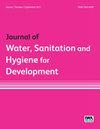应对加纳城市用水不安全:模式、决定因素和后果
IF 1.4
4区 环境科学与生态学
Q3 WATER RESOURCES
Journal of Water Sanitation and Hygiene for Development
Pub Date : 2023-01-25
DOI:10.2166/washdev.2023.203
引用次数: 0
摘要
在撒哈拉以南非洲,快速城市化在水安全和相关健康风险方面带来了前所未有的挑战。与大多数撒哈拉以南非洲国家一样,许多加纳家庭无法获得安全管理的饮用水源,只能依靠拼凑的替代水源来满足他们的用水需求。本文通过对阿克拉和塔马莱家庭中活跃的成年取水者的调查(n=1192),研究了加纳资源受限社区水不安全应对策略的决定因素和影响。研究结果表明,缺水家庭更有可能采取行为、身体以及行为和身体相结合的应对策略。在旱季,家庭更有可能使用行为(OR=5.64,p=0.00)、身体(OR=3.18,p=0.00。与富人相比,不太富裕的人(OR=0.27,p=0.00)不太可能采用身体和行为应对策略。同样,男性采用行为应对策略的可能性较小(OR=0.64,p=0.03)。研究结果可以帮助从业者识别弱势群体,并提供有针对性的干预措施,寻求在短期内建立或加强应对策略。本文章由计算机程序翻译,如有差异,请以英文原文为准。
Coping with water insecurity in urban Ghana: patterns, determinants and consequences
In Sub-Saharan Africa (SSA), rapid urbanization poses unprecedented challenges in terms of water security and associated health risks. Like most SSA countries, many Ghanaian households lack access to safely managed drinking water sources and resort to a patchwork of alternative sources for their water needs. This paper examines determinants and implications of water insecurity coping strategies in resource-constrained neighborhoods in Ghana, using a survey (n = 1192) of adult active water collectors within households in Accra and Tamale. Findings suggest that water insecure households were more likely to adopt behavioral, physical and a mix of behavioral and physical coping strategies. Households were more likely to use behavioral (OR = 5.64, p = 0.00), physical (OR = 3.18, p = 0.00) and behavioral and physical (OR = 4.20, p = 0.00) coping strategies in the dry season. Compared with the wealthy, the less wealthy (OR = 0.27, p = 0.00) were less likely to employ a mix of physical and behavioral coping strategies. Likewise, males were less likely (OR = 0.64, p = 0.03) to employ a behavioral coping strategy. The findings can help practitioners identify vulnerable groups and provide targeted interventions that seek to build or strengthen coping strategies in the short term.
求助全文
通过发布文献求助,成功后即可免费获取论文全文。
去求助
来源期刊

Journal of Water Sanitation and Hygiene for Development
WATER RESOURCES-
CiteScore
3.10
自引率
11.80%
发文量
58
审稿时长
16 weeks
期刊介绍:
The Journal of Water, Sanitation and Hygiene for Development is a peer-reviewed journal devoted to the dissemination of high-quality information on the science, policy and practice of drinking-water supply, sanitation and hygiene at local, national and international levels.
 求助内容:
求助内容: 应助结果提醒方式:
应助结果提醒方式:


